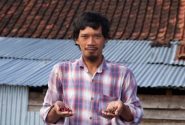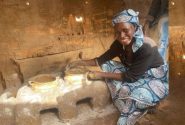
Charcoal, wood after being burned – Forest near Village of Ovangoul, Central Region, Cameroon. Ollivier Girard.
YAOUNDE, Cameroon (12 October, 2012)_As part of efforts to sustainably manage charcoal production in West Africa, policy makers should consider giving decision-making powers and responsibilities to the actual producers and traders, a new study by the Center for International Forestry Research says.
In developing countries across the globe, the poor rely on wood fuel as their principal source of energy.
That’s especially true in Africa, with the International Energy Association estimating that up to 93 percent of rural and 58 percent of urban households are dependent on charcoal for cooking.
“In developed countries such as in Europe, we usually think of wood fuel as a modern energy source, such as using high-tech techniques to use wood fuel for the generation of heat and electricity,” says CIFOR researcher Jolien Schure, lead author of the study which appears in the journal Energy for Sustainable Development.
“But for millions of people it is still something mainly women and children have to walk for miles to obtain.”
It’s also a vital source of income, with Schure and his colleagues estimating that 13 million people in Sub Saharan Africa earn cash through the production of biomass energy (primarily fuel wood and charcoal).
In theory, the best way to make sure local producers continue to benefit economically and that wood fuel is produced sustainably, is to create formal institutions that will allocate permits to prevent over harvesting and put in place tax schemes that allow the government to re-invest in social and environmental services, such as schools, hospitals and tree-replanting schemes.
In developed countries such as in Europe, we usually think of wood fuel as a modern energy source…but for millions of people it is still something mainly women and children have to walk for miles to obtain.
In reality, however, because most wood fuel production in Africa occurs outside the formally regulated channels, laws and other official measures have little impact. In Brazzaville (the capital of the Republic of Congo), less than 10 percent of the wood fuel that entered the city had been officially registered. In Kinshasa (in the Democratic Republic of Congo), only three percent of the city’s fuel had been produced with a permit. Tax revenues and thus the capacity to develop the nation’s infrastructure are lost.
“When weakly implemented, such regulations and permits breed corruption, making it even harder for rural producers to reap economic benefits,” said Verina Ingram, CIFOR scientist and co-author of the paper.
The urban distributors and salesmen along the supply chain can create false taxes and isolated producers can have difficulty accessing the permit system. Policies shaped in urban environments can even unintentionally be biased towards urban distributors and fail to create benefits for rural producers.
“The most interesting thing for me about this work is the tension between the idea that formal institutions are theoretically good, and the fact that in practice it doesn’t always work out that way,” says Patrice Levang, CIFOR scientist based in Cameroon and co-author of the study.
He and his colleagues say that devolving rights and responsibilities closer to the level of the producers, combined with strong monitoring, clear incentives for sustainable production and consistent investment in social services and environmental benefits, appears pragmatic and workable, based on the most successful experiences in countries such as Senegal.
“This issue is of real importance for the livelihood of charcoal producers,” says Schure. “This is hardly ever considered as one of the primary aim when designing new policies for managing the sector.”
This publication is part of CIFOR’s research programme on Forests, Trees and Agroforestry. The research on DRC is part of CIFOR’s contribution to the Makala project “Sustainable management of woodfuel in the Democratic Republic of Congo” (2009-2013), coordinated by CIRAD and realized with financial support of the European Union.
We want you to share Forests News content, which is licensed under Creative Commons Attribution-NonCommercial-ShareAlike 4.0 International (CC BY-NC-SA 4.0). This means you are free to redistribute our material for non-commercial purposes. All we ask is that you give Forests News appropriate credit and link to the original Forests News content, indicate if changes were made, and distribute your contributions under the same Creative Commons license. You must notify Forests News if you repost, reprint or reuse our materials by contacting forestsnews@cifor-icraf.org.










